Dr. Silvia Formenti never imagined she’d become a world-renowned researcher when she started her medical career. But while she was a resident in Italy, three cancer patients she had grown close to all died within the same month. “To learn that these patients whom I had really cared for had passed away made me rethink how I could make an impact,” says Dr. Formenti, who is Radiation Oncologist-in-Chief at NewYork-Presbyterian/
That proposal received funding and brought her to the University of Southern California to study human monoclonal antibodies, marking the start of a four-decade career as a physician-scientist. Dr. Formenti’s work has helped introduce a new role for radiation therapy in cancer treatment: as a tool that stimulates the immune system to recognize a tumor and reject it. Her research has shown that by combining immune checkpoint inhibitors with focal radiation, the immune system could be activated to fight cancer, with the irradiated tumor acting much like a vaccine — unlocking a potentially game-changing cancer treatment.
While radiation-based immunotherapy is still far from broad clinical implementation, Dr. Formenti recognizes that every trial of this novel application is a step toward bringing hope to people with few treatment options. One of her most gratifying moments is the yearly visit she gets from a former patient who went into remission from advanced metastatic non-small cell lung cancer after undergoing this experimental treatment. “It was clearly an exceptional case, but the pleasure I derive from seeing this patient every year is much greater than any publication or award,” she says.
Dr. Formenti spoke to NYP Advances to discuss what she’s learned along her path as a physician-scientist and why research is such a critical component of patient care.
What made you choose oncology as your specialty?
When I started doing my clinical rotations in Italy, I noticed there was a difference in how doctors interacted with cancer patients compared with patients who had more treatable diseases like cardiovascular disease, kidney dysfunction, and even neurological dysfunction. When cancer was the diagnosis, there seemed to be a lack of communication and less attention given to the patient. That helped me decide on oncology because, at least back then, cancer patients seemed to me to be the most underserved.
What has compelled you to continue pursuing research throughout your career?
It’s about empathy. Feeling the pain of others doesn't drain me or take away from me, it makes me work harder. It reminds me of the pressing need for the research we do: to improve outcomes in patients.
Feeling the pain of others doesn't drain me or take away from me, it makes me work harder. It reminds me of the pressing need for the research we do: to improve outcomes in patients.





